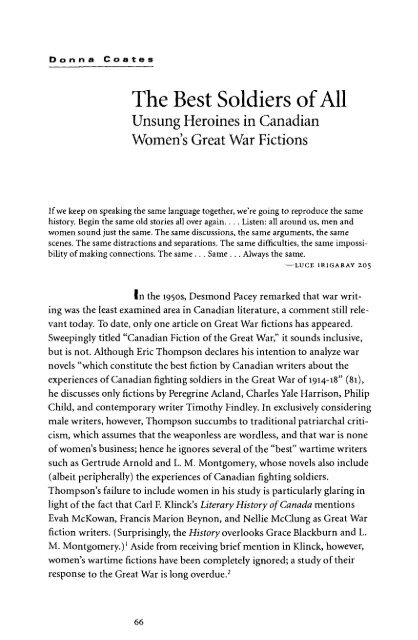Jean Rivard - University of British Columbia
Jean Rivard - University of British Columbia
Jean Rivard - University of British Columbia
You also want an ePaper? Increase the reach of your titles
YUMPU automatically turns print PDFs into web optimized ePapers that Google loves.
Donna<br />
Coates<br />
The Best Soldiers <strong>of</strong> All<br />
Unsung Heroines in Canadian<br />
Women's Great War Fictions<br />
If we keep on speaking the same language together, we're going to reproduce the same<br />
history. Begin the same old stories all over again. . . . Listen: all around us, men and<br />
women sound just the same. The same discussions, the same arguments, the same<br />
scenes. The same distractions and separations. The same difficulties, the same impossibility<br />
<strong>of</strong> making connections. The same . . . Same . . . Always the same.<br />
LUCE IRIGARAY 205<br />
In the 1950s, Desmond Pacey remarked that war writing<br />
was the least examined area in Canadian literature, a comment still relevant<br />
today. To date, only one article on Great War fictions has appeared.<br />
Sweepingly titled "Canadian Fiction <strong>of</strong> the Great War," it sounds inclusive,<br />
but is not. Although Eric Thompson declares his intention to analyze war<br />
novels "which constitute the best fiction by Canadian writers about the<br />
experiences <strong>of</strong> Canadian fighting soldiers in the Great War <strong>of</strong> 1914-18" (81),<br />
he discusses only fictions by Peregrine Acland, Charles Yale Harrison, Philip<br />
Child, and contemporary writer Timothy Findley. In exclusively considering<br />
male writers, however, Thompson succumbs to traditional patriarchal criticism,<br />
which assumes that the weaponless are wordless, and that war is none<br />
<strong>of</strong> women's business; hence he ignores several <strong>of</strong> the "best" wartime writers<br />
such as Gertrude Arnold and L. M. Montgomery, whose novels also include<br />
(albeit peripherally) the experiences <strong>of</strong> Canadian fighting soldiers.<br />
Thompson's failure to include women in his study is particularly glaring in<br />
light <strong>of</strong> the fact that Carl F. Klinck's Literary History <strong>of</strong> Canada mentions<br />
Evah McKowan, Francis Marion Beynon, and Nellie McClung as Great War<br />
fiction writers. (Surprisingly, the History overlooks Grace Blackburn and L.<br />
M. Montgomery.) 1 Aside from receiving brief mention in Klinck, however,<br />
women's wartime fictions have been completely ignored; a study <strong>of</strong> their<br />
response to the Great War is long overdue. 2<br />
66

















